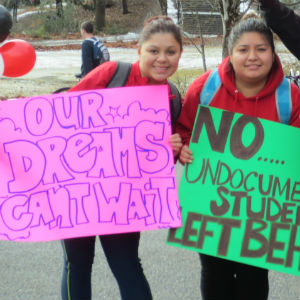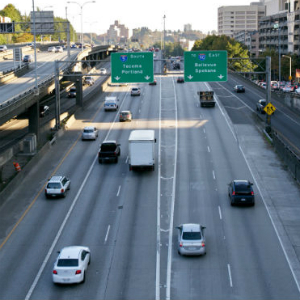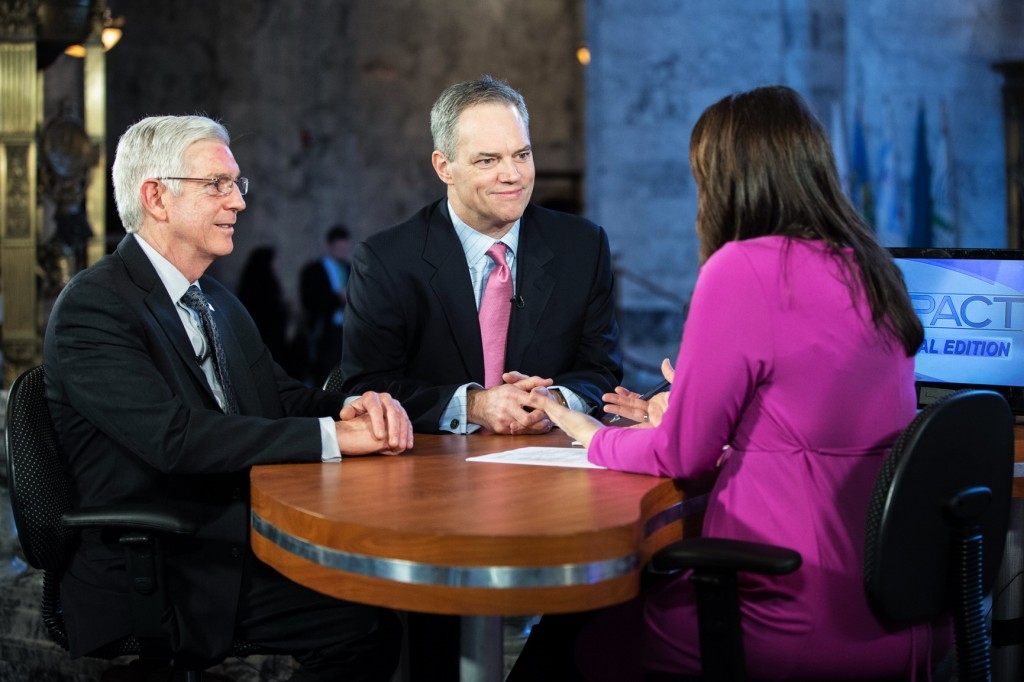Table of Contents
Introduction
DREAM Act
Early Learning Quality
Transportation
K-12 Education
24-Credit Graduation Requirement
Teacher and Principal Evaluation Changes
Supplemental Budget
Issues People are Writing in About
Oil Tax Loophole
Background Checks for Gun Purchasers
Age Wave Study
Hospital Mergers
Contact Me
Introduction
Thank you again for allowing me the opportunity to serve the community in the Legislature. This is my 12th year in this role and I am proud to have been elected by my peers to be chairman of the Appropriations committee, responsible for writing the state budget.
The overall state of the economy is fair to OK, with state revenues increasing about as fast as we had predicted they would. For once, we have no major problems to address in the supplemental budget. I’m working on a number of other projects this year in addition to the budget, and this update is current as of the first two weeks of the legislative session.
DREAM Act
 I’m pleased the Senate has agreed to pass a Washington State version of the DREAM Act.
I’m pleased the Senate has agreed to pass a Washington State version of the DREAM Act.
This will allow about 1100 undocumented kids a year who have grown up next door to us, gone to school with our kids, and who are here through no fault of their own the chance to apply for state financial aid to help pay for college.
We invest about $10,000 per year for each student in the K12 system. It makes no sense to invest that kind of money only to shut these kids out of any chance to finish their education and make a living.
These are bright young minds that grow up in Washington and in our schools, but the high cost of college with no options for state financial aid closes the door to a brighter future. The DREAM Act will open those doors of opportunity for thousands of young students.
Early Learning Quality
 In the first week of the 2014 session I introduced a major bill, HB 2377, to improve the quality of our early learning system. Senator Steve Litzow (R-41) is sponsoring an identical companion bill in the Senate.
In the first week of the 2014 session I introduced a major bill, HB 2377, to improve the quality of our early learning system. Senator Steve Litzow (R-41) is sponsoring an identical companion bill in the Senate.
Why does early learning matter? The research tells us that the return on investment in early learning programs is high.
First, we should see increased kindergarten readiness in both cognitive (academic) and non-cognitive (i.e. grit, persistence, self-regulation, etc.) skills.
Second, most high quality programs have shown significant long-term increases in positive outcomes like reduced incarceration, increased high-school graduation rates, reduced teen pregnancy, job success, etc. All of these reduce taxpayer costs in the future in very large ways. (This comment shows you how one’s perspective can be skewed by doing the budget for a long time.
A better argument is that these programs significantly improve outcomes for low-income children.) Currently, we have three large public programs that serve preschool-aged kids:
- Head Start, a federal preschool program that serves 8,000 low-income kids in Washington State,
- Early Childhood Education and Assistance Program (ECEAP), a state program modeled after Head Start, that serves 8,500 children, and
- Working Connections Child Care (WCCC), a state childcare subsidy program that serves 45,000 – 50,000 children
In general, the ECEAP and Head Start do a better job at enhancing school readiness, but are not available for enough time during the day to have stronger impact.
The research, from sources like the Gates Foundation, is clear that in early learning programs, quality matters. To that end, HB 2377 has three main goals:
1. Improve the quality of WCCC. For licensed providers caring for children covered by the Working Connections program, we combine some carrots (increased reimbursement, improved coaching and mentoring) with a strong stick – by 2020, they must meet Level 3 (out of 5) in our nationally recognized Early Achievers rating system, an incentive program that evaluates and rewards providers based on a number of child learning and development outcomes.
2. Ensure the quality of ECEAP and extend the length of the day. Right now, ECEAP provides only 2.5 hours per day of care. Kids need 6 to 6.5 hours of quality care to meet reasonable expectations for school readiness, so we’re working to require our current providers to offer a full-day program.
3. Consolidate the regulations so that providers only have to deal with one consistent set of rules. This is a big piece of work to get licensing requirements lined up with our standards for quality, and should result in more consistent quality of care. You’ll hear more about this bill as we go through the session.
On a side note, Seattle is also considering a plan to provide universal preschool for all three- and four-year-old kids in the city. We’re working with Councilmember Burgess to ensure that we share the quality system and prevent redundancies.
Transportation
 We enter the 2014 session with little progress made on a transportation plan for Washington. Here’s the situation: – A key element of King County’s Metro transit funding tax package is about to expire, leaving a budget gap that will require a 17% reduction in service to fill.
We enter the 2014 session with little progress made on a transportation plan for Washington. Here’s the situation: – A key element of King County’s Metro transit funding tax package is about to expire, leaving a budget gap that will require a 17% reduction in service to fill.
Absent action from the Legislature this session, Executive Constantine will put a proposal on the ballot in late spring. – The 520 bridge project is entering a critical phase – the portion that we have funded to date will be complete, even though there is still further work to be done.
If the delay extends more than a year or two we will likely have to re-permit the project, a multi-year, multi-million dollar exercise in stupidity. – There are many bridges and roads in much worse shape than the Skagit River Bridge that fell down last winter. The Department of Transportation does not have the funds in its base budget for the regular maintenance and replacement costs of this infrastructure.
The Legislature must specifically provide the money. – The population in Washington State will increase by about 750,000 additional people in the next ten years. Around half of these new residents will live or work in King County. Downtown Bellevue will have almost four times more people working in it than are there today.
This necessitates expansion work on our highways, including some intersections on 520. Most observers in the media and the business community think we should raise the gas tax to fund new investments in transportation infrastructure.
The impasse in negotiations seems to be less about the project list but more about where the money will come from to pay for it. The Senate Republicans are insisting on using non-transportation funds like the sales tax (which funds public education) and funds from the voter-passed Model Toxics Control Act (MCTA), which is dedicated to cleaning up Superfund sites.
Personally, I’m loath to make these changes. Shifting receipts from the sales tax away from the general fund would change 50 years of practice. Washington State does not have an income tax. Consequently over 50% of our revenue comes from the sales tax.
We can’t have our cake and eat it too – either the sales tax applies to larger categories of goods and services than it does in other states or we switch to a different tax strategy.
We already lack money to meet constitutional obligations to our public schools. Shifting money from the general fund to transportation would require raising taxes to backfill the money going to education.
This seems to be against the Republican rhetoric. The MTCA funds are needed to clean up toxic sites. It’s why the voters approved the tax and we should leave the funding there. If we want to raise funds for transportation we should do so. While I disagree with using non-transportation funds, I’m open to compromise on the issue of how to allocate money between the competing priorities of highways, transit, bicycles, and pedestrian projects.
This seems like the core of a transportation bill. In general I think local communities should fund their own transit, as it tends to be urban communities that have the need and the capability to do so. The state does need to provide funds to communities for projects like safe sidewalks to get kids to school, key bike infrastructure, etc.
As an example, we’re working hard to ensure that the bicycle path that runs from the 520 landing in Medina all the way to Redmond is safe and inviting; we expect it to be a major commuting corridor. Every one of the Lycra-clad commuters shivering in the rain is one fewer car you have to share the bridge with.
Don’t laugh too loudly at them though – it might be me. :) If King County goes ahead and passes a package of taxes to fund transit operations, I think it will be very difficult to get a highway investment package done statewide.
This is the one fact that cheers me about the prospects here – it puts pressure on the negotiators to come up with a deal that preempts King County from going it alone.
K-12 Education
The week before session started, the Supreme Court issued an order to follow up on the Legislature’s progress in adequately funding K-12, as per the McCleary ruling in 2012. This new order calls for two things. – A long term plan.
The court wants us to agree on a comprehensive yearly plan for meeting the target funding level that they set for 2018, and then go do it. We have a plan that was approved with bipartisan support in 2009, five years ago.
The Senate Republicans are backing away from a plan that passed in 2009 with Republican votes, including Senator Tom’s. We’ve learned more since then and have some updates that need to be made, but the core of the plan is the same as it was in 2009. – More action.
This is harder to define, but the court called for us to take concrete action this session to increase education spending again, with proposed funds in the $400-$500 million range. They also asked us to factor in a new cost– capital construction of schools.
The original House budget offer to the Republicans was based on the 2009 plan, and had we adopted it last session the court would be much happier today. Bringing the current budget up to where the House offer was last year would require another $400 million investment, plus about $50-60 million for the teacher COLA the court called for.
24-Credit Graduation Requirement
Over time the definition of “basic” education changes as the needs of the economy grow and become more complex. In the 19th century, basic literacy became important and Washington started providing an 8th grade education to its citizens.
Today, young people need to earn at least some kind of post-secondary certificate to be economically self-sufficient. (This means being able to move out of our houses, an incredibly important goal.)
The State Board of Education has worked for several years to define what students need to master in high school in order to succeed in post-secondary education, be it a technical certificate or a four-year degree.
Their proposal, the “Career and College-Ready Graduation Requirements,” based on a 24-credit framework, is well thought out and makes a ton of sense. We have been waiting on implementation until the Legislature funded enough instruction for a six-period day, which you need for 24 credits to make sense.
We finally did that in the 2013-15 budget passed last session. This session, we need to pass legislation to enable the new definition to take effect with the next entering class. Most serious observers of the education system think this is an idea whose time has come.
I have been, and continue to be, a strong supporter of this and will push legislation this session to move it forward.
Teacher and Principal Evaluation Changes
Many, many years ago, back in the dark days of George W. Bush’s presidency a little bill called the “No Child Left Behind Act” passed. This bill put in place a system that was so magical that it guaranteed that every child would achieve at a given academic level, as measured by tests, by 2014.
This didn’t actually come to pass and because Congress is so dysfunctional, they can’t update the bill. Now, Washington is in danger of losing Title I funds, money provided through this bill, unless we change our teacher evaluation system.
Right now school districts CAN use the results from state-wide assessments of student learning as part of their teacher evaluations. The federal government is requiring us to change this to a “MUST.”
I used to believe that we could construct a teacher evaluation system based solely on student test results. For many reasons I no longer believe this, but I do think we should take student learning into account, particularly with teachers that are either strikingly good and those at the other end of the spectrum. This change will be contentious, as you might expect.
Supplemental Budget
Other than fulfilling the McCleary obligation, there will be little change to the supplemental budget. Since we write a two-year budget during odd years (2013-14), we have to come back in the middle during the short session (2014) and fix things that have gone wrong.
Big things that will impact the budget: – We settled a case with the federal government about children’s mental health. This is an important step forward in providing care for children with severe mental illnesses, and we expect it to cost $8 million or so in this budget and about $35-40 million per year when fully implemented.
States that provided similar levels of care to Washington and who fought similar lawsuits in court have lost badly, so we thought we’d negotiate something that works. – There were a lot of fires and disasters. It always seems like there are more than you like.
Our planning tool tends to under-predict acts of nature, so we wind up putting more money into the budget to cover those problems. – Some of the assumptions we made in the original budget have turned out to be incorrect.
If you remember my complaints about the Republican offer from the Senate, you won’t be surprised about this. We will fix these problems.

To pass a budget these days we have to meet several constraints:
1. Balance the budget. This won’t be hard unless people want to spend a lot of money.
We have about a $214 million predicted ending balance after we take care of most of the “must-do items.”
2. Spend less than the expenditure limit established under initiative 601 passed in 1993. The budget we passed last summer was reasonable, but since then estimates for personal income growth have fallen a little and we expect the second year budget to be slightly over the limit. Slightly means that the treasurer would probably have to stop writing checks mid-afternoon on the last day of the year. However, this is mainly technical at this point and we expect to fix it.
3. Meet the conditions of the 4-year balanced budget law. Our budget met this criteria when we left in late June, but we are changing some of the assumptions about how employee healthcare costs are calculated and we will need to adjust the budget or the requirement accordingly.
Issues People are Writing in About
Two weeks into the session and we are already buried in email. Here are my answers to some popular topics.
Oil Tax Loophole
In 1949, a tax exemption was created to exempt the timber industry’s burning of wood scraps for energy. Since then it has been used by the oil industry to exempt their use of fuel in refining activities.
This is not the original intent of the exemption. A bill has been proposed for many years to end this exemption, of which I am a co-sponsor this year. I believe the money could be more effectively used to fund early learning or a cost-of-living adjustment for teachers. The oil industry doesn’t agree.
Background Checks for Gun Purchasers
Initiative 594 is very much like a bill I co-sponsored last year to create a system of universal background checks. Today, if you buy a gun at a dealer, a background check is required before the final sale. However, 40% of gun purchases happen outside dealers. The initiative (and last year’s bill) applies the same background check system for these sales. I am a strong supporter of requiring background checks for all gun purchases and will support legislation to that effect.
Age Wave Study
We baby-boomers are aging, even though we are all working really hard to delay it. A demographic bulge is approaching our taxpayer-funded Medicaid nursing home and other long-term care facility budget and we’re trying to figure out a solution.
When seniors no longer have any money (which happens quickly if you are in a nursing home), taxpayers are on the hook for their care. There are several options we’re looking at, but an employment-based savings option seems like a sensible approach.
I’d like to get some actuarial data about the option before we jump in and I expect a long-term care study to move forward in that area.
Hospital Mergers
There have been a number of you who signed a petition voicing concerns about mergers between religious and secular hospitals in our state. I share in the belief that it is important to safeguard access to reproductive rights, dignified end-of-life options, and compassionate care for LGBT families as this process takes place.
Last June, Governor Inslee asked the Department of Health to review and make changes to the Certificate of Need rules, which outlines state oversight over hospital mergers and expansions. After a public hearing, the Department of Health formally adopted some amendments to the rules in December.
The new rules require hospitals to post their policies on admission, non-discrimination, end-of-life treatment and reproductive health on their websites. The Department of Health has to do the same as well.
These new rules are a step in the right direction for making these mergers more transparent. We don’t have a bill yet that prevents hospitals from denying services based on religious beliefs, but I’ll continue to monitor this issue.
Contact Me
I love to hear from you about your issues, suggestions, or concerns. We can solve a lot of problems for people, direct you to resources, etc. During the time between legislative sessions, my assistant Marilyn Pedersen and I have an office in Bellevue and it’s best to contact us there. Representative Ross Hunter
Olympia Office 315 John L. O’Brien Building Capitol Campus Olympia, WA 98504 Phone: (360) 786-7936
Bellevue Office 16011 – 116th Ave NE Suite 206 Bellevue, WA 98009 Phone: (425) 453-3064
Email: hunter.ross@leg.wa.gov I maintain a web site at www.rosshunter.info You can sign up for regular updates there, or join my Facebook network.
